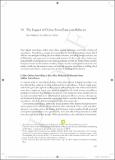The impact of online surveillance on behavior
Author(s)
Tucker, Catherine Elizabeth
DownloadAccepted version (172.4Kb)
Open Access Policy
Open Access Policy
Creative Commons Attribution-Noncommercial-Share Alike
Terms of use
Metadata
Show full item recordAbstract
Mass digital surveillance differs from older, analog, and more overt forms of physical surveillance. Nonetheless, empirical research after the Snowden revelations shows that it still has a meaningful chilling effect on online behavior, including Google searches, use of Wikipedia, and expression of controversial opinions. In the courts, these studies may help plaintiffs challenging mass surveillance programs in both the United States and the European Union to demonstrate standing. In the executive and legislative branches, the studies enable the discussion to move on from the question of whether a chilling effect exists from surveillance, to the question of what, if anything, to do about it. How Online Surveillance May Affect Behavior Differently from Offline Surveillance A common trope in surveillance debates claims that subjects of digital surveillance are less affected than subjects of more traditional direct surveillance. A driver might panic and hit the gas at the sight of a police cruiser parked along the side of the road, but the same driver might not much care about or respond to the kinds of mass surveillance programs revealed by the Snowden documents. This skepticism stems mainly from an accurate perception that overt, individualized analog surveillance conveys a stronger signal of interest by the government in a particular citizen’s activities than does mass digital surveillance, which by definition is general rather than particular. Conventional surveillance prior to the broad adoption of the Internet tended to involve intense physical surveillance of individuals by other individuals. This is costly and labor-intensive; even states such as the former East Germany, which employed both overt and covert physical surveillance on a grand scale, were only able to keep dossiers on a little more than one-third of their people. Physical surveillance, the cultivation of informants, and infiltration of dissident groups by undercover police officers continue, have in some respects expanded, and are still highly controversial. But the digital superstructure of surveillance has become, since the advent of the Internet, both much more pervasive than offline surveillance and much more understandable using empirical methods than it was before.
Date issued
2017-06Department
Sloan School of ManagementJournal
The Cambridge handbook of surveillance law
Publisher
Cambridge University Press
Citation
Marthews, Alex & Catherine Tucker. “The impact of online surveillance on behavior.” The Cambridge handbook of surveillance law, part 3 (June 2017): 393-508 © 2017 The Author(s)
Version: Author's final manuscript
ISBN
9781107137943
9781108515344